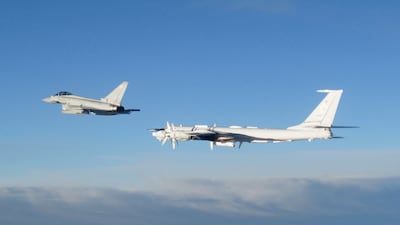Russian bombers have been intercepted by British warplanes while flying off the Scottish coast, the UK government said on Monday.
Two Russian long-range maritime patrol bombers flew near the Shetland Islands, within Nato’s northern air policing area, the government said.
Typhoon jets were scrambled from RAF Lossiemouth, in the north-east of Scotland, to monitor them in international airspace in the early hours of the morning.
“The Russian Tu-142 Bear-F and Tu-142 Bear-J maritime patrol aircraft, used for reconnaissance and anti-submarine warfare, were monitored by RAF Typhoons in international airspace as they passed north of the UK,” the UK Ministry of Defence said.
A Voyager, the RAF’s air-to-air refuelling tanker, was also sent to the area and remained until the mission was completed.
“RAF crews at Lossiemouth maintain a constant watch over UK airspace and are always ready to take action at a moment's notice to keep our country safe,” Armed Forces Minister James Heappey said.
“Pilots launched in their Typhoon jets to intercept two Russian long-range bombers this morning, monitoring them as they passed north of the Shetland Islands, ready to counter any potential threat to UK territory.”
The lead RAF Typhoon pilot said the “adrenalin kicked in” as soon as the alarm was raised.
“It’s really satisfying to know we’ve been able to make a successful intercept, maintaining the integrity of UK and Nato airspace,” said the pilot.
“When the alarm for a scramble happened in the early hours of the morning, the adrenalin kicked in.
“Working in tandem with ground control operators, and with air-to-air refuelling from an RAF Voyager, we were able to stay on task until the mission was complete, and the target aircraft departed the UK’s area of interest.”
Russian warplanes that stray into the UK’s controlled zone of international airspace often do not communicate with air traffic control, the ministry said.
They also routinely refrain from “squawking”, which involves broadcasting a code to ensure they are visible to other aircraft in the vicinity and air traffic controllers on the ground.
In May, Typhoon jets at Lossiemouth were sent to monitor Russian military aircraft near UK airspace.


